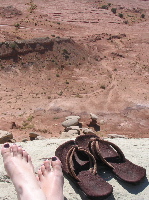Google Sky and Astronomy for the Masses
So some lady just called me looking for the Political Science department .... I told her that I am in the Astronomy department, not Political Science. So she asked me if I believe the universe is expanding. Yes ... "That's because of the redshifts, right?" Yeah ... "So who owns the Hubble telescope?" Uh ... "The US Government owns the Hubble telescope, right?" Well, I wouldn't put it quite like that. "The French government doesn't operate it, so it must be the US." Does that really follow? "Astronomy is a science, right? What's the phone number of the chair of the science department?" Uhm ... It's 6pm... I don't think anyone is going to be in their offices right now. Sigh. I clearly need more practice talking to crazy people while still allowing them to remain "interested" in astronomy, though this one seemed rather well-informed, albeit with big warning bells going off all over the place. In other news, Google announced today that the Sky is now part of the Earth, in that Google Sky is now part of Google Earth. This was enough of an incentive for me to finally download Google Earth and waste lots of time looking at pretty galaxies and galaxy clusters and nebulae and other such fun things. Constellations and planet orbits are included. Much like Google Earth, Google Sky is much more in the hokey fun category than the useful category, and unfortunately the objects I'm prone to looking at first are the ones I know well enough to be annoyed at how poor some of the data is. The entire sky has been mapped by the Digital Sky Survey (DSS), and a fourth of it by the more recent and absolutely fantastic Sloan Digital Sky Survey (SDSS). The Sloan images include all of the delightful astrometric precision of SDSS, as well as all five wavelength bands of the survey. Then, for the popular select few objects, the Hubble Heritage project has kicked in with "informative" blurbs about "zoom lenses" (also known as "the Virgo Cluster") and other such things, though one useful bit about these is the links to outside sources like ADS for said objects. The Hubble Heritage project by itself is a pretty interesting archive to nose around in if you haven't already, as well as the recently released Hubble Legacy Archive (which is actually good for scientific purposes).
Sigh. I clearly need more practice talking to crazy people while still allowing them to remain "interested" in astronomy, though this one seemed rather well-informed, albeit with big warning bells going off all over the place. In other news, Google announced today that the Sky is now part of the Earth, in that Google Sky is now part of Google Earth. This was enough of an incentive for me to finally download Google Earth and waste lots of time looking at pretty galaxies and galaxy clusters and nebulae and other such fun things. Constellations and planet orbits are included. Much like Google Earth, Google Sky is much more in the hokey fun category than the useful category, and unfortunately the objects I'm prone to looking at first are the ones I know well enough to be annoyed at how poor some of the data is. The entire sky has been mapped by the Digital Sky Survey (DSS), and a fourth of it by the more recent and absolutely fantastic Sloan Digital Sky Survey (SDSS). The Sloan images include all of the delightful astrometric precision of SDSS, as well as all five wavelength bands of the survey. Then, for the popular select few objects, the Hubble Heritage project has kicked in with "informative" blurbs about "zoom lenses" (also known as "the Virgo Cluster") and other such things, though one useful bit about these is the links to outside sources like ADS for said objects. The Hubble Heritage project by itself is a pretty interesting archive to nose around in if you haven't already, as well as the recently released Hubble Legacy Archive (which is actually good for scientific purposes).


